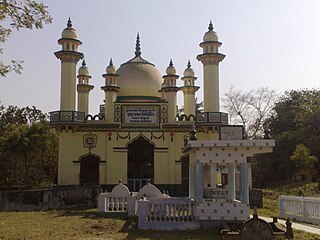Related Research Articles

The Bangla Academy is an autonomous institution funded by the Bangladesh government that fosters the Bengali language, literature and culture, works to develop and implement national language policy and to do original research in the Bengali language. Established in 1955, it is located in Burdwan House in Shahbagh, Dhaka, within the grounds of the University of Dhaka and Suhrawardy Udyan. The Bangla Academy hosts the annual Ekushey Book Fair.

Aliah University is a public state university in New Town, West Bengal, India. Previously known as Mohammedan College of Calcutta, it was elevated to university in 2008.
Abu Sayeed Chowdhury was a jurist and the second president of Bangladesh. Besides that, he held the positions of the Chairmen of the United Nations Commission on Human rights, the vice-chancellor of the University of Dhaka, the Foreign Minister of Bangladesh and the first Bangladesh High Commissioner to the UK.

Maulana Azad College is a public institute of liberal arts, commerce and science in India, located in central Kolkata, West Bengal, India. The college is fully government-administered. It is located near the junction of Rafi Ahmed Kidwai Road and SN Banerjee Road, popularly called "Lotus crossing".
Dewan Mohammad Azraf was a Bengali philosopher, teacher, author, politician, journalist and activist. In 1993, he was honoured as a National Professor in Bangladesh. He was also a supporter of the Bengali Language Movement. For his support of the movement, he was dismissed from the post of the principal of Sunamganj College in 1954, the same year he was promoted to the post. His support was particularly influential when he edited the Nao Belal in 1948. He was actively involved with Kaikobad Sahitya Majlish (1972–99).

Furfura Sharif is a village in Jangipara community development block of Srirampore subdivision in Hooghly District in the state of West Bengal, India. It is a holy place for some Bengali Muslims. Before the afternoon prayers, people queue up at the mazar (shrine) of Mohammad Abu Bakr Siddique (1846–1939), a prominent pir of the town. People say it is the second most prominent mazar in the country after Ajmer Sharif Dargah in Rajasthan.
Serajul Huq was a Bangladeshi educationist.
Abū al-Khayr Muḥammad Ayyūb ʿAlī al-Māturīdī, or simply Ayub Ali, was a Bangladeshi Islamic scholar, author and educationist. He was awarded the Ekushey Padak in 1976 by the Government of Bangladesh.

Kamaluddin Abdullah Zafree is an Islamic scholar from Bangladesh. He is the founder of the non-profit Bangladesh Islami University, currently serving as the chairman of its Board of Trustees, and has established many madrasas and orphanages across the country. Zafree is also a member of the Supreme Council of the Muslim World League and a member of the Central Sharia Board for the Islamic Banks of Bangladesh. He currently serves as the imam of the Uttara Jame Mosque in Dhaka.
The Khalji dynasty was the first Muslim dynasty to rule Bengal. The dynasty, which hailed from the Garmsir region of present-day Afghanistan, was founded in 1204 by Muhammad Bakhtiyar Khalji, a Muslim Turko-Afghan general of the Ghurid Empire. The Khaljis initially pledged allegiance to Sultan Muhammad of Ghor until his death in 1206, though their rule in Bengal was mostly independent. Under the rule of Iwaz Khalji, Bengal experienced major developments such as its first naval force, flood defence systems and linkage with the Grand Trunk Road. The dynasty was based in the city of Lakhnauti in northern Bengal, later expanding eastwards and southwards. Nasiruddin Mahmud, the son of Mamluk sultan Iltutmish of Delhi managed to conquer Bengal in 1227; although the Khaljis briefly reasserted their independence, they surrendered to the Mamluks in 1231, who replaced them with a series of regional governors.
Muhammad Abdullah was a Bangladeshi Islamic scholar and academic. He was a professor of Dhaka University and researcher.

Athar Ali was a Bangladeshi Islamic activist, author, teacher and politician. He participated in the Indian independence movement, and was former president of the Nizam-e-Islam Party. Ali was also a khalifah of Ashraf Ali Thanvi, one of the founders of the Deobandi movement.
Hooghly Madrasah is one of the oldest educational institute in West Bengal. It was established by a renowned philanthropist of Bengal, Haji Muhammad Mohsin.

Moḥammad Abū Bakr Ṣiddīque al-Qurayshī was a Bengali Islamic scholar and the inaugural Pir of Furfura Sharif in West Bengal. He is regarded by his followers, who are scattered across eastern India and Bangladesh, as a mujaddid (reviver) of Islam in the region, due to his significant contributions in religious propagation via the establishment of mosques and madrasas, publication of newspapers and education development in neglected areas. He was the founding president of the sociopolitical Anjuman-i-Wazin-i-Bangla organisation, which advocated for causes such as the Khilafat Movement and Pakistan Movement. Siddique died in 1943, and his shrine is greatly venerated as one of West Bengal's most prominent Sufi centres.
Majd ad-Dīn al-Madanī, also known as Madan Shāhjahānpūrī, was an 18th-century Indian Muslim theologian. He served as the first principal of the Calcutta Madrasa, the first Alia Madrasa of Bengal.

Ḥabībullāh Qurayshī was a Bengali Islamic scholar and educationist of the Deobandi movement. He was the founding director-general of Al-Jamiatul Ahlia Darul Ulum Moinul Islam.

Abū az-Zibriqān ʿAbd ar-Raḥmān ibn ʿAbd al-Hādī Dāmullā al-Kāshgharī an-Nadwī, or simply Abdur Rahman Kashgari, was one of the leading scholars of the Arabic language and literature in the Indian subcontinent. Of Uyghur background, Kashgari migrated from East Turkestan to India at an early age, completing his studies in Lucknow where he became an accomplished Islamic scholar, linguist, poet and author. He then migrated to Bengal, where he eventually became the principal of Dhaka Alia Madrasa. Kashgari was also the first khatib of the Baitul Mukarram National Mosque, holding this role until his death.
Abul Hasan Jashori was a Bangladeshi Islamic scholar, politician, author, teacher and freedom fighter. He was the founding principal and Shaykh al-Hadith of the Jamia Ezazia Darul Uloom Jessore institution.

Nesaruddin Ahmad was a Bengali Islamic scholar, spiritual reformer, educationist and writer. He was the main disciple of Furfura Sharif's Mohammad Abu Bakr Siddique in eastern Bengal. Ahmad was the inaugural Pir of Sarsina, having founded the Sarsina Darbar Sharif and Darussunnat Kamil Madrasa in 1915, one of the largest Islamic institutions in South Bengal and the first major alia madrasah after Calcutta. Ahmad was among the leading Islamic leaders in colonial Barisal, and his influence extended across Bengal. The Nesarabad Upazila of Bangladesh has been named after him.

Abū Naṣr Muḥammad Waḥīd, or simply Abu Nasr Waheed, was a Bangladeshi Islamic scholar, educationist, author and politician. He is best known for his reformations to Islamic education in Bengal, and development of Arabic language education among Bengali Muslims. Wahid also served as the Education Minister of British Assam and a member of the Assam Legislative Assembly.
References
- 1 2 3 Chakraborty, Ratan Lal. "Habibullah, ABM". Banglapedia. Retrieved 31 January 2019.
- ↑ "The genius of Abu Mohamed Habibullah". The Daily Star. 26 May 2012. Retrieved 31 January 2019.
- ↑ "University of Dhaka". du.ac.bd. Retrieved 31 January 2019.